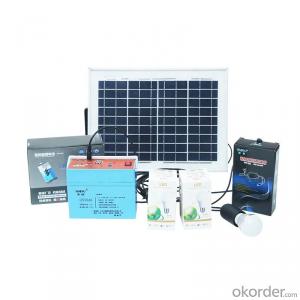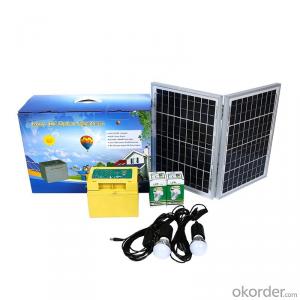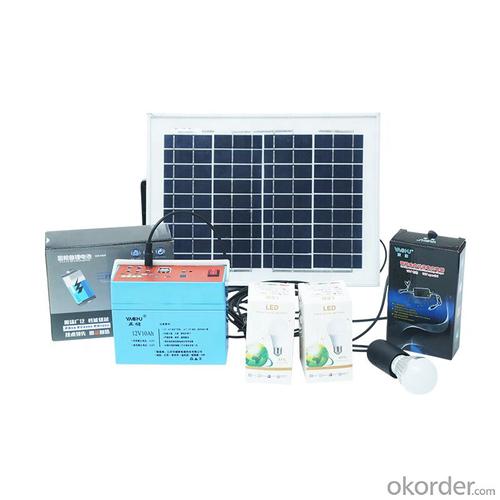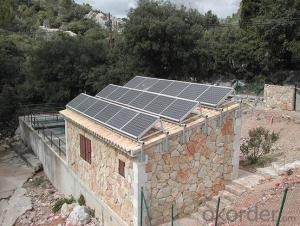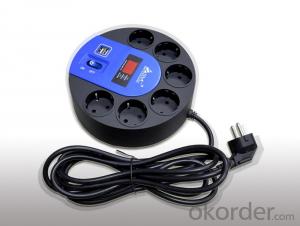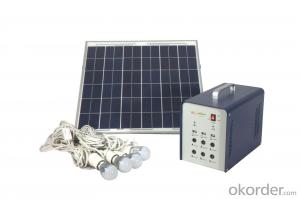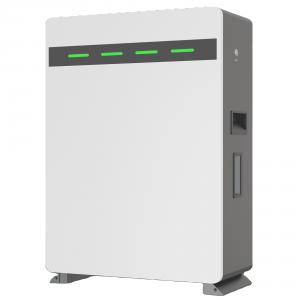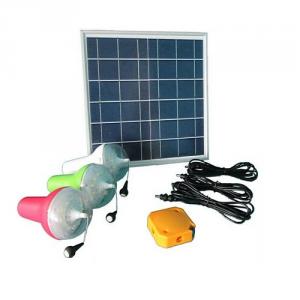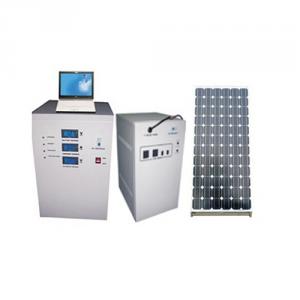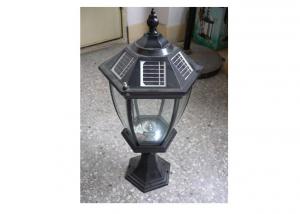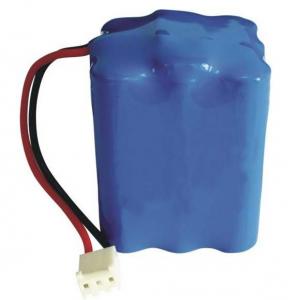11.1V 10AH Lithium Battery Portable Solar System 111W solar light Home Appliance
- Loading Port:
- Shanghai
- Payment Terms:
- TT OR LC
- Min Order Qty:
- 50 mm
- Supply Capability:
- 2000 mm/month
OKorder Service Pledge
OKorder Financial Service
You Might Also Like
Specification
1.Description of 11.1V 10AH Lithium Battery Portable Solar System 111W solar light Home Appliance
The portable system consist of solar panel, lithium battery,controller, bulbs and calbes, portalbe and easy to use.
2. Specifications of 11.1V 10AH Lithium Battery Portable Solar System 111W solar light Home Appliance
Place of Origin: Jiangsu, China
Solar Panel Type: Polycrystalline Silicon
Battery Type: Lithium Ion
Controller Type: PWM
Mounting Type: Ground Mounting
Load Power (W): 111W
Output Voltage (V): 9-12.6V
Work Time (h): 24HR
Certificate: CE, UN38.3
3. Main features of Portable solar system
- Economic & convenient.
- Clear & legible working status display.
- High efficient solar panel.
- With USB charger and high brightness LED lamp.
- Easy to carry and quick to installation.
- Comprehensive system protection,such as surge, short circuit, reverse connection, overload and others.
- Reliable operation, superior performance, simple operation and the less maintenance.
4. Images of Portable solar system parts



5. Details of packages
Sea transport packages: carton, pallet
- Q: Can solar energy systems be used for water heating in swimming pools or hot tubs?
- Yes, solar energy systems can be used for water heating in swimming pools or hot tubs. Solar thermal collectors are commonly employed to capture sunlight and convert it into heat, which can then be transferred to the water in pools or hot tubs. This eco-friendly and cost-effective method can significantly reduce the energy consumption associated with heating water for recreational purposes.
- Q: How much space is needed to install a solar energy system?
- The amount of space required for installing a solar energy system varies based on several factors such as the capacity of the system, the type of solar panels used, and the available sunlight. On average, for residential installations, a solar energy system typically requires around 100-400 square feet of roof space per kilowatt (kW) of solar capacity. However, ground-mounted systems can require more space, especially for larger installations. It is essential to conduct a site evaluation to determine the specific space requirements for a solar energy system.
- Q: What is the impact of solar energy systems on water usage?
- Solar energy systems have a positive impact on water usage as they require very little water for their operation. Unlike traditional energy sources such as coal or nuclear power plants, solar panels do not need water for cooling or steam generation. This reduces the strain on water resources, which is especially important in water-scarce areas. Additionally, solar energy systems can be used for water purification and desalination, further contributing to water conservation and sustainability.
- Q: How do solar energy systems impact renewable energy targets?
- Solar energy systems have a significant impact on renewable energy targets as they contribute to increasing the overall share of renewable energy in the energy mix. By harnessing the power of the sun, solar systems generate clean electricity, reducing the reliance on fossil fuels. This helps countries and communities to meet their renewable energy targets by diversifying their energy sources and reducing greenhouse gas emissions. Additionally, the scalability and accessibility of solar technology make it a viable option for both large-scale projects and individual homeowners, further accelerating the progress towards renewable energy targets.
- Q: How much sunlight do solar panels need to generate electricity?
- Solar panels need direct sunlight to generate electricity. The amount of sunlight required varies depending on factors such as panel efficiency and geographical location. However, as a general guideline, solar panels typically need about 4-5 hours of direct sunlight per day to generate a significant amount of electricity.
- Q: How do solar energy systems impact the quality of indoor air?
- Solar energy systems have a positive impact on the quality of indoor air. By harnessing the sun's energy, solar systems eliminate the need for fossil fuel-based energy sources, thus reducing the emission of harmful pollutants such as carbon dioxide, sulfur dioxide, and nitrogen oxides. This reduction in emissions leads to cleaner air indoors, promoting better health and reducing the risk of respiratory problems for occupants.
- Q: Can solar energy systems be used in areas with limited roof access for maintenance?
- Yes, solar energy systems can be used in areas with limited roof access for maintenance. While it is more common to install solar panels on rooftops for optimal sun exposure, there are alternative options available. Ground-mounted solar panels can be installed in areas where roof access is limited, allowing for easier maintenance and cleaning. Additionally, solar panel systems can also be integrated into other structures such as carports or pergolas, providing an alternative to traditional rooftop installations. These alternatives ensure that solar energy systems can be utilized effectively in areas with limited roof access for maintenance.
- Q: Can solar energy systems be used in powering green hotels or eco-resorts?
- Yes, solar energy systems can definitely be used in powering green hotels or eco-resorts. Solar power is a clean and renewable source of energy that can greatly contribute to reducing the carbon footprint of these establishments. By installing solar panels on the roofs or open spaces of hotels and resorts, they can generate electricity from the sun's rays and use it to power their operations. Solar energy systems can provide a significant portion, if not all, of the electricity needed to run a green hotel or eco-resort. This includes powering lighting systems, heating and cooling systems, water pumps, and other electrical appliances. The excess energy generated during the day can also be stored in batteries or fed back into the grid to be used during nighttime or low sunlight periods. Implementing solar power in these establishments not only helps reduce their dependence on fossil fuels but also makes them more self-sufficient and resilient to power outages. It aligns with their commitment to sustainability and eco-conscious practices, attracting environmentally conscious travelers who prioritize staying in green accommodations. Furthermore, solar energy systems can also enhance the overall guest experience at these hotels and resorts. They can provide opportunities for educational tours and demonstrations where guests can learn about the benefits of solar power and the importance of renewable energy sources. This can create awareness and inspire guests to adopt sustainable practices in their own lives. In conclusion, solar energy systems are an excellent choice for powering green hotels or eco-resorts. They offer a clean, renewable, and reliable source of electricity that aligns with their sustainability goals. By harnessing the power of the sun, these establishments can reduce their carbon footprint, enhance their guest experience, and contribute to a more sustainable future.
- Q: Can solar energy systems be used for heating and cooling a home?
- Yes, solar energy systems can be used for heating and cooling a home. Solar heating systems, such as solar thermal collectors or solar water heaters, can be used to heat water or air for space heating purposes. Additionally, solar air conditioning systems, such as solar-powered absorption or desiccant cooling systems, can be used to cool a home using the energy from the sun.
- Q: Can solar energy systems be installed in areas with high snowfall?
- Yes, solar energy systems can be installed in areas with high snowfall. While snow can temporarily reduce the efficiency of solar panels by covering them, it is still possible to generate electricity from solar energy during winter months. Additionally, advancements in technology have led to the development of snow-shedding designs and tilt systems that can help minimize snow accumulation on panels. Regular maintenance and cleaning can further optimize the system's performance in snowy conditions.
Send your message to us
11.1V 10AH Lithium Battery Portable Solar System 111W solar light Home Appliance
- Loading Port:
- Shanghai
- Payment Terms:
- TT OR LC
- Min Order Qty:
- 50 mm
- Supply Capability:
- 2000 mm/month
OKorder Service Pledge
OKorder Financial Service
Similar products
Hot products
Hot Searches
Related keywords
